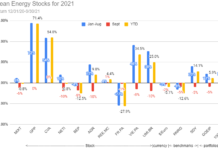by Jim Lane
It’s been a very busy week in Washington DC, the high point being a letter to seven senators sent late Thursday by EPA Administrator Scott Pruitt, who took significant (and as of a few days ago, unexpected) steps toward strengthening the foundation for ethanol and renewable fuels.
The truth? It’s a Trump Administration back-down. EPA overreached on de-clawing the Renewable Fuel Standard on behalf on some grumpy oilpatch donors (known as GODs), and the Trump Administration managed to revive a Grand Alliance around renewable fuels — one that now includes almost 40 members of the United States Senate, numerous midwestern Governors, and a string of trade associations not limited to but including BIO, Growth Energy, the National Biodiesel Board, the Advanced Biofuels Business Council, and the Renewable Fuels Association.
The Pruitt letter in summary
The Administrator, in beating a retreat from an aggressive effort at fuel volume rollback that came out this summer, emphasized his commitment to implementing renewable fuel volumes at or above levels proposed, as well as to examining the Agency’s authority to fix regulations that currently limit the year-round sale of E15 and higher ethanol blends.
Administrator Pruitt also said the Agency would not pursue regulations to change the treatment of RINs relative to ethanol exports, a proposal that would have undermined the integrity of the RFS and our exports.
What the roll-back proposed to roll-back
What is known in Washington DC as a NODA — and here on Earth we call a notice — proposed reductions in the 2018 Renewable Volume Obligations for biodiesel, advanced, and total renewable fuel including a proposal to reduce the biodiesel volume for 2018 by as much as 315 million gallons and the advanced and total renewable biofuels by 473 million gallons. Doing so would reduce the 2018 advanced RVO to 3.77 billion gallons (down from 4.24 billion proposed) and would have dropped the total renewable fuel volume to 18.77 billion gallons (down from 19.24 billion proposed).
“EPA’s proposal would chill investment at a time when more cellulosic and advanced biofuel capacity is poised to come online, as evidenced by the recent approval of a new cellulosic ethanol facility,” Brent Erickson, executive vice president, Biotechnology Innovation Organization (BIO), said. “The agency should commit to setting 2018 standards that support continued growth of biofuel production and use.”
How it got done
If you called the EPA’s retreat a “welcome piece of stability for renewable fuels”, you can thank a collection of Trump Whisperers — midwestern GIOP Senators including Iowa’s Joni Erntz and Charles Grassley, Nebraska’s Deb Fischer and Ben Sasse, Kansas’ Pat Roberts, and South Dakota’s John Thune and Mike Rounds. They were among a group of 38 Senators that wrote to the EPA Administrator in support of the Renewable Fuel Standard last month, alarmed at efforts at the EPA to cut back on Renewable Fuel Volumes.
Senator Joni Erntz wrote:
“Over the last few weeks, I had serious concerns about the EPA following the spirit and the letter of the RFS, which I made clear to my committee colleagues, the EPA, and the White House. Tonight, I’m pleased to see these commitments from EPA Administrator Pruitt to uphold the RFS as intended by Congress.
Longtime Erntz friend and ally, Iowa Governor Kim Reynolds, added:
“The purpose of the Renewable Fuel Standard is to grow demand for biofuels while driving the industry to innovate. Unfortunately, the Environmental Protection Agency’s proposals seem to take us backward, not forward. While I have appreciated the accessibility of the EPA and have had many positive conversations about the RFS, I have some significant concerns with the direction the agency appears to be taking.”
At risk: Trump’s Rural America support?
As Iowa RFA executive director Monte Shaw noted, “The July RFS proposal wasn’t good, but Iowans optimistically clung to President Trump’s promise to make renewable fuels an integral part of an America First energy plan and hoped for the best in a final rule. But in recent weeks EPA has delivered a one-two punch that makes it clear the EPA is not on track to uphold the President’s commitment to biofuels. The President must intervene to put the EPA back on track with his own publicly expressed energy views or risk irrevocably losing the trust of rural Americans.”
Worth noting that Shaw recently ran for Congress as a GOP candidate.
The 5 Legal Arguments that underpinned the action
Underneath the political heft was an ominous legal analysis by BIO and Growth Energy — not easily ignored since the Fuels American coalition engineered a huge win for the industry in a recent Circuit Court ruling on the 2014, 2015 and 2016 renewable fuel volumes.
The trade associations contended that:
1. Promotion of U.S. energy independence does not justify a waiver of the RFS volumes.
2. Definition of domestic supply under the RFS for consideration of EPA’s waiver authority includes and has always included foreign-produced renewable fuel that is available to U.S. importers.
3. EPA may not consider RIN costs when assessing their general waiver authority.
4. EPA has no authority to carry through the reductions in advanced biofuel to total renewable fuel.
5. EPA should follow its previous interpretations of the severe harm standard; there is no basis for a waiver of the 2018 volumes based on severe harm.
Relief but not happiness for biodiesel’s fans
Doug Whitehead, chief operating officer at the National Biodiesel Board, said that “Flat volumes of biodiesel show that the Trump administration is considering implementing policies that will harm the American biodiesel industry. We are going to continue to work closely with the EPA and the White House to help them understand that a robust biodiesel industry is what the law requires. We cannot settle for the biomass-based diesel volume remaining flat at 2.1 billion gallons.
The NBB had recently submitted comments to the EPA affirming that “the U.S. biomass-based diesel industry can generate 2.6 billion gallons right now and has the additional registered capacity to ramp up production even higher with sufficient continuing support from the RFS volumes. In other words, it is clear that domestic production alone could generate substantially more than the 2.1 billion-gallon volume in EPA’s proposed rule.”
NBB’s complete letter is here.
“Not enough”
“Simply not making further cuts to proposed levels that were already too low is not enough,” said Iowa RFA’s Monte Shaw. “To live up to the letter and spirit of the RFS in the final rule, the EPA must increase levels for biodiesel and cellulosic ethanol from what was proposed in July. Furthermore, IRFA strongly urges EPA to affirm its authority to grant E15 volatility parity. This one step would do more to ease RFS compliance and lower the price of RINs than anything else.”
Meanwhile, Edeniq is more specific on cellulosic numbers, encouraging the EPA to ensure that it includes in the final 2018 RFS rule a cellulosic RVO that reflects actual expected production next year. They asked the Agency to include the cellulosic RVO contained in the original 2018 proposed RFS rule that was sent to the Office of Management and Budget in May, 384 million gallons.
Edeniq’s complete letter is here.
Action This Day on dumping at the Department of Commerce
Though the National Biodiesel Board is grumpy about biodiesel volumes, the NBB’s Fair Trade Coalition won a preliminary antidumping determination from the Commerce Department regarding dumped biodiesel imports from Argentina and Indonesia. The Commerce Department found that biodiesel imports from Argentina and Indonesia are sold into the United States below fair value, and they imposed preliminary duties on imports from these countries based on the amount of dumping found.
As a result of Commerce’s ruling, importers of Argentinian and Indonesian biodiesel will be required to pay cash deposits on biodiesel imported from those countries. The cash deposit rates range from 54.36 to 70.05 percent for biodiesel from Argentina, and 50.71 percent for biodiesel from Indonesia, depending on the particular foreign producer/exporter involved. The duty deposit requirements are in addition the deposits required pursuant to Commerce’s preliminary countervailing duty determination in August, which confirmed that biodiesel producers in Argentina and Indonesia have received massive subsidies.
Action This Day on Waiving Down the RFS
In a letter to President Donald Trump late last week, Democratic Pennsylvania Governor Tom Wolf asked the administration to waive Renewable Fuel Standard Renewable Volume Obligations for Northeast refiners unless or until the prices of Renewable Identification Numbers deflate.
“The primary driver behind this waiver request is Philadelphia Energy Solutions, owner and operator of the oldest refinery in the nation. It is not the fault of the RFS or RINs that PES can’t compete with newer, more efficient refineries that have better access to lower-priced, lighter crude oil sources,” said Renewable Fuels Association CEO Bob Dinneen.
“Numerous studies—including some funded by the oil industry—show that merchant refiners recover their RIN costs at the wholesale level, while retail gasoline prices are unaffected by RINs. However, even if a refiner could show that RINs truly represent a cost that is not recouped, for a waiver to be granted, EPA must find that implementation of the RFS itself would severely harm the economy, not just contribute to such harm on one sector of the economy.
“By any measure, the RFS has actually helped, not harmed, the economy. Since 2005 when the RFS was initially enacted, U.S. ethanol industry jobs grew 121% to 339,176 in 2016, and the value of the industry’s output quadrupled to $32.8 billion last year. Meantime, ethanol is currently priced below petroleum, and the RFS allows consumers to take advantage of the cleanest, lowest cost and highest-octane fuel on the planet.”
Moving on to the Farm Bill
Next up on the industry’s “Prevent Defense” agenda is saving key provisions of the Farm Bill, where concerns especially focus on the fate of the Section 9003 Loan Guarantee program.
The Biotechnology Innovation Organization and 66 renewable chemical producers asked that Congress “fully and unconditionally allow renewable chemical standalone manufacturing facilities” to receive Section 9003 Program loan guarantees without requiring production of advanced biofuels and irrespective of advanced biofuels feedstocks.
BIO’s letter explains, “Renewable chemicals can also generate a high value relative to transportation fuels, which will provide economic stability for the construction of the entire biorefinery. Therefore, these renewable chemical standalone manufacturing facilities need to be constructed first and operated with innovative technologies to build the economic value to support advanced biofuels, which is a component in the biorefinery.”
BIO and the renewable chemical companies add, “Several renewable chemical startups and mature chemical companies are waiting to build their first-of-a-kind manufacturing facilities in the United States from homegrown biomass and technologies and will do so with the proper federal policy support. These renewable chemical manufacturing facilities will pay strong dividends in the future of U.S. chemical manufacturing and, in turn, they will improve the trade balance, maintain U.S. leadership in renewable energy and manufacturing, create thousands of high quality U.S. jobs, provide value-added crop for products, and reduce dependence on foreign oil.”
BIO’s complete letter is here.
The Bottom Line
As Winston Churchill once observed at the time of Dunkirk:
We must be very careful not to assign to this deliverance the attributes of a victory.
Progress is not made by avoiding rollbacks any more than wars are won by evacuations. But wrapped inside the deliverance was a victory, and that is the reformation and emergence of a robust renewable fuels coalition for the Trump Era.
We’ll put this victory in Churchillian terms. Many supporters of renewable fuels have not seen this Grand Alliance at work; they saw only the EPA proposals, and the disappointing renewable fuel volumes, and a rollback of investment in R&D at the Department of Energy and the Agricultural Research Service, and the attempt to wipe out the Rural Business Service. So, people underrate the achievements of the Grand Coalition: that’s why we go out of our way to tell you about it.
This was a great trial of strength between the Administration and the Grand Alliance. Can you conceive of a greater objective for the Boys from Oklahoma than to rollback the Renewable Fuel Standard in such a way as to block any future increases in volumes or eliminate any policy uncertainty that there would be public support for renewable fuels? Could there have been a more significant opportunity for them in the War on Renewables than to attack the one piece of low carbon legislation on the federal books, the Renewable Fuel Standard, as soon as possible in the Trump Administration, in the hours after Trump’s stunning victory at at the polls?
As Churchill himself observed of the Axis Forces in 1940:
“They tried hard, and they were beaten back; they were frustrated in their task.”
Jim Lane is editor and publisher of Biofuels Digest where this article was originally published. Biofuels Digest is the most widely read Biofuels daily read by 14,000+ organizations. Subscribe here.








